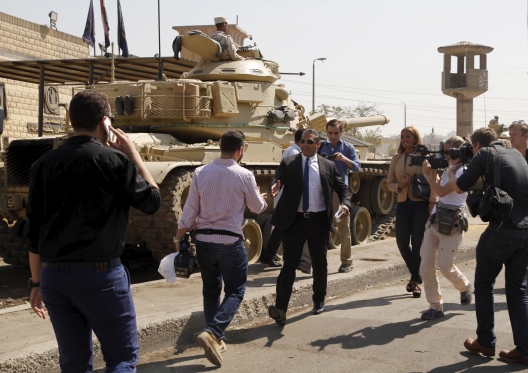 Another blistering hot day in Tora in the southwest of Cairo ended with disappointment yet again for Al Jazeera English journalists Mohamed Fahmy and Baher Mohamed. The verdict for the long running retrial was postponed for the second time in three days to August 29.
Another blistering hot day in Tora in the southwest of Cairo ended with disappointment yet again for Al Jazeera English journalists Mohamed Fahmy and Baher Mohamed. The verdict for the long running retrial was postponed for the second time in three days to August 29.
Presiding Judge Hassan Farid was not in court amid reports of an illness that prevented him from announcing the verdict days earlier. Essam Abu El Ela, a senior judge, took less than a minute to read the postponement.
“We didn’t do anything wrong. It’s disappointing and now there’s more suffering with the wait,” Baher Mohamed told EgyptSource outside the courtroom. Before the first postponement, Mohamed Fahmy and his then-fiancée Marwa Omar had hurriedly married. “I wanted to complete the marriage before the verdict because if we were married, Marwa could easily visit me in prison,” Fahmy told reporters on July 30. Mohamed and Fahmy, meanwhile, still have to report on a daily basis to police stations close their homes, as stipulated by the conditions of their release on bail in February this year.
The journalists were originally sentenced to seven to ten years in prison for spreading false news and aiding the Muslim Brotherhood, now deemed a terrorist organization in Egypt. Mohamed and Fahmy along with their Australian colleague Peter Greste, who was deported in February but is still being retried in absentia, flatly deny the charges.
The latest delay coincided with US Secretary of State John Kerry’s visit to Cairo and was cause for speculation for Mohamed. Fahmy’s wife intimated that the postponement might have to do with the anticipated opening of the expanded Suez Canal on August 6. Judicial sources had earlier told Aswat Masriya that the trial was postponed due to Farid’s illness.
The timing of these events was also raised by Amal Clooney, Fahmy’s international lawyer, in a piece she penned for The Huffington Post exhorting President Abdel Fattah al-Sisi to intervene in order to release her client. Clooney concludes her article saying, “This show trial is a simple example of political score-settling between Egypt and Qatar, which funds Al Jazeera, at the journalists’ expense.”
Adel Iskandar, a professor at Simon Fraser University and co-author of one of the first academic monographs of the news network, Al Jazeera: The Story of the Network that is Rattling Governments and Redefining Modern Journalism, explains that the politicization of the case can only drag out for so long. “Expecting to manipulate this current Egyptian regime by scandalizing it on its human rights record is a losing battle, or blackmail the country’s politicized judiciary at this time is extremely far-fetched,” Iskandar told EgyptSource.
Al Jazeera has spearheaded an international free press campaign, ranging from taking out ad space in the New York Times to calling for a global day of action with the popular hashtags of #FreeAJStaff and #Journalismisnotacrime. They have also taken to social media periodically, sharing photos of Mohamed with his wife and children, and condemning the proceedings in court. On July 30, with the first delay, Al Jazeera’s spokesperson tweeted, “We are extremely angry that the verdict has been adjourned today.” Similar denouncements were made following the August 2 decision. The network, however, had also launched a lawsuit against the Egyptian government in May 2014, while the journalists were imprisoned. Iskandar describes the move as short-sighted. Fahmy himself was critical of Al Jazeera’s decision to sue the Egyptian government, and recently brought an $83 million lawsuit against the network for negligence. Al Jazeera denies the claims.
While the case has become an international press freedom issue, Egyptian authorities have continued to stress the independence of Egypt’s judiciary. Iskandar contends that authorities have “muzzled oppositional media, demonstrated stubbornness and strong will (read by many pro-regime Egyptians as independence) in the face of unrelenting international pressure, and sent a clear message to its adversary Qatar that its colossal international media footprint and clout has virtually no effect inside Egypt”.
Sisi, however, has made statements denying the politicization of the trial. “I wished they were deported immediately after they were arrested instead of being put on trial,” he said of the journalists last year, two weeks after they were sentenced.
Before the August 2 session, Fahmy predicted that they will be convicted. “I know tomorrow we’re going to be convicted. But the question is are we going to be convicted and sent back to prison, or are we going to get a one year suspended sentence?” he said in an interview on ABC’s Foreign Correspondent. Immediately after hearing the news thousands of mile away in Australia, Greste says, “This case has dominated our lives to such an extent and for such a long time that none of us are able to get on with our lives.” As the journalists prepare for the verdict once more on August 29, Mohamed visibly frustrated says, “I want to work again as a journalist and live a normal life.”
Farid Farid is a journalist based in Cairo. His work has been published in various outlets including The New York Times, The Guardian, Egypt Independent and in academic journals including Social Semiotics. Follow him on Twitter:@FaridYFarid
Image: Photo: Al Jazeera television journalist Baher Mohamed (L) talks on the mobile as journalist Mohamed Fahmy (C) reaches out to shake hands with a TV journalist as they arrive outside Tora prison in Cairo, Egypt, July 30, 2015 (Asmaa Waguih/Reuters)
